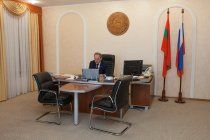 Русский
Русский English
English-







The Agenda supplemented
The Supreme Council in the first reading will consider law-in-draft with amendments to the law "On social protection of disabled people" in the course of the plenary session on the 2nd of June. It is proposed to establish a monthly compensation payment for disabled children who, due to health reasons, cannot attend educational institutions or day care centers for children with disabilities.
Children who were entitled to free meals or meals on preferential terms were provided with food packages or paid monetary compensation during the state of emergency.
Only 657 out of 1244 children with special needs in Pridnestrovie are covered by education. Almost half of children with special needs cannot receive education or study at home for health reasons. The children have not been provided with such a measure of state support either now or before. The law-in-draft proposes to establish, from the 1st of January, 2022, a monthly compensation payment in the amount of 45 minimum wage to disabled children who, for health reasons, cannot attend educational institutions or day care centers for children with disabilities.
Deputies will consider the law-in-draft with amendments to the law "On measures of state support in connection with the introduction of a state of emergency and (or) restrictive measures (quarantine) aimed at preventing the spread of coronavirus infection caused by a new type of COVID-19 virus in 2020 and 2021" in the first reading in the course of the plenary session tomorrow. The legislative initiative of a group of deputies of the Supreme Council proposes to extend the right to preferential subsidies to those families that at the time of the entry into force of the law "On state support for young families for the purchase of housing" (March 14, 2020) were classified as young families.
The necessity to amend the law is due to the fact that during the period of the introduction of quarantine and restrictive measures aimed at preventing the spread of coronavirus infection, many families belonging to the "young family" category were unable to exercise their right to receive subsidized subsidies provided for by law. The funds reserved in 2020 for these purposes were used to combat the pandemic including due to the fact.
The deputy corps will consider in the first reading the law-in-draft with amendments and additions to the Labor Code of the PMR a week later, on June 9.
The initiative of parliamentarians concerns the regulation of remote work and the temporary transfer of an employee to this type of work at the initiative of the employer.
The Labor Code was supplemented in 2020 with a new category of workers – remote workers. The basic law spelled out the features of the regulation of their labor. At the same time, the Labor Code does not yet provide for situations of temporary distance employment. In addition, the articles of the Code regulate the issues of temporary transfer to remote work, however, epidemic situations and temporary transfer of workers to such a working regime are not covered by these articles.
The law-in-draft provides for the division of remote work into types depending on the duration. Thus, at the legislative level, a new type of remote work is introduced – temporary. This concept includes remote work of a continuous nature for a period of up to six months or alternation of remote work at a stationary workplace.
The law-in-draft spelled out the specifics of the working time and rest time of a remote worker. The conditions and procedure for calling a remote worker to a stationary workplace, additional guarantees for labor remuneration, grounds for terminating an employment contract with a remote worker, and the procedure for temporary transfer of an employee to remote work at the initiative of the employer will also be determined.




